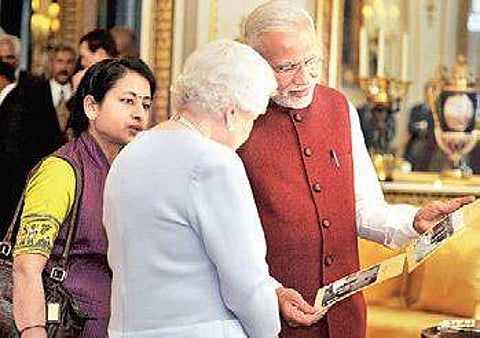

Prime Minister Narendra Modi’s visit to London was ostensibly for participating in a Summit meeting of 53 Commonwealth countries, from across the world. It, however, had other important facets—most notably in building a more robust relationship with the UK. The country now faces an uncertain future, after the British people took what many believe was an unwise decision, to quit its membership of the European Union, following a referendum, on the issue.
The British are now realising that exit from the European Union is going to be a painful experience. The Government of Prime Minister Theresa May, facing the prospect of future electoral defeat, has to look at reviving and strengthening relations with former British colonies. India will have a crucial role in this British diplomatic rebalancing, because of its size, strength and economic potential. The British Government, therefore, spared no effort—including the Monarchy—to ensure that India attended the London Summit gathering,There are interesting facets to Indo-UK political ties.
While the Labour Party in the UK favoured the grant of independence to India, Winston Churchill’s Conservatives were opposed. These equations changed drastically over the years. While Conservative Prime Ministers ranging from Ted Heath to David Cameron, were very friendly to India, their Labour counterparts from Harold Wilson to Tony Blair were distinctly hostile. This trend has continued, as Labour candidates are dependent on Pakistani immigrants and especially Mirpuri Kashmiris from Pakistan Occupied Kashmir, as committed vote banks.
The Labour largely echoes Pakistani positions on Jammu and Kashmir. Past Labour governments have also changed the earlier British positions on the depiction of India-China borders, in their official maps.
Modi and May predictably dealt with increasing cooperation on a wide range of issues, including climate change, defence, finance and high technology. But, what one is seeing today is really something of a reversal of history. While the British East India Company engineered the domination and virtual takeover of the Indian economy by the British Empire, the current pattern of the Indo-UK economic relationship is drastically different.
While the Modi-May declaration speaks of a new technological partnership, it is the business partnership that is really flourishing. India is the third largest source of FDI in the UK. Indian companies, which have created over 1,10,000 jobs in the UK, are the second largest international job creators there. Over 800 India-linked companies are listed on the London Stock Exchange. The UK is also a major trading partner with annual bilateral trade in goods and services having crossed $25 billion. But in recent years, British investment in India does not have the same salience as in the past, as other EU countries such as Germany and France step up their economic presence and defence cooperation with India.
One should not be overly carried away by unrealistic expectations from these recent developments in relations with the UK. The UK is tightening its immigration laws. Jobs and educational opportunities for Indians will be more easily available in the US and Canada, than in the UK. The UK wields little residual maritime influence “East of Suez” and may not be able to significantly reinforce the US, India, Australia, Japan “Quad”, for dealing with an aggressive China, across the Indian Ocean. Besides, with the likelihood of the Labour Party returning to power after the next elections, the UK will become a more salient hub for anti-Indian separatist and terrorist activities, sponsored by Pakistan. This was evident in the anti-India demonstrations during the Modi visit.
dadpartha@gmail.com